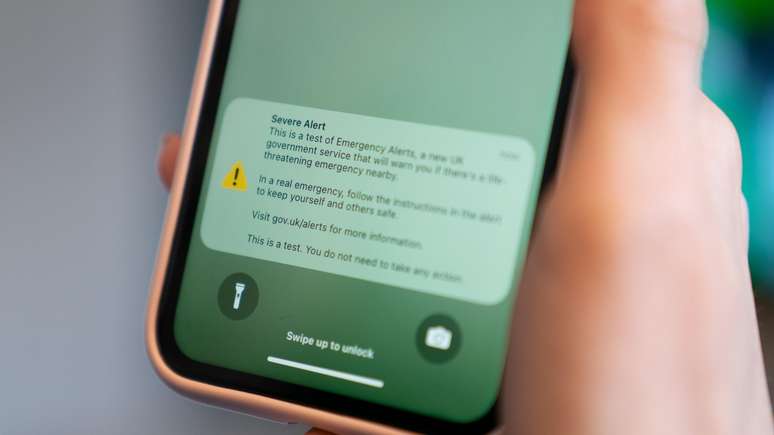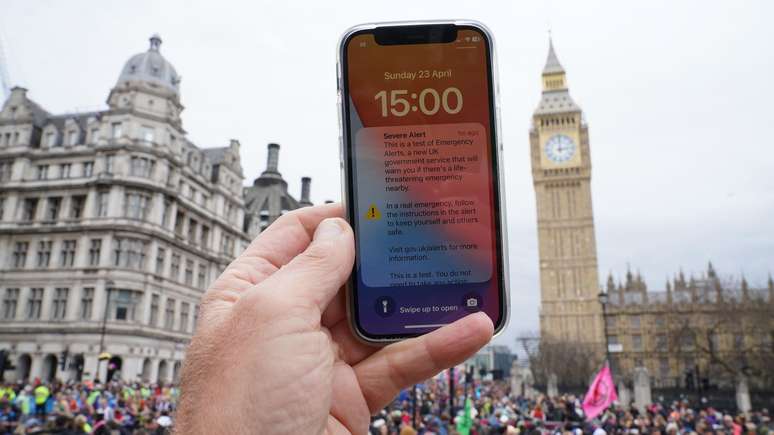The UK government activated a test siren last Sunday (23/04) as part of a new public warning system to be used in the event of impending natural disasters or terrorist attacks.
On Sunday (23/4), at exactly 3.00pm local time (11.00am GMT), millions of mobile phones in the UK started sounding a loud emergency siren and displaying a warning message. Devices in silent mode also rang.
The siren is part of a government test of a system that will be used to warn the public of life-threatening emergencies such as severe floods, fires and extreme weather, and could also be used during terrorist attacks.
The intention of the British government was for all mobile phones in the country to sound the siren, but there were technical problems and not all raised the alarm, which was accompanied by a message on the device’s screen. The message explained that people should not take any action and that the siren was just a test.
Even among the mobile phones that sounded the siren, many rang just before or just after 3 pm. The government announced in advance that it would test the alarm system. Authorities have urged people not to turn off their phones.
All Android and Apple 4G and 5G phones are equipped with the ability to send an emergency alert even in silent mode. Similar systems are already being used in other countries, including the US, Canada, Japan and the Netherlands.
Deputy Prime Minister Oliver Dowden said the alert “could be the sound that saves your life”.
He said testing the system was “like when the fire alarm goes off at work.”
“It can be a little uncomfortable and irritating,” she said. “I think in the future people will be thankful that we tested the system”
“Government’s number one job is to keep people safe and this is another tool in our kit for emergencies like flood or fire and where there’s a real risk to life.”
Reviews
However, there have been allegations that the emergency alert was exacerbated state interference in people’s lives.
“The nanny rule is back: warn us, tell us, cuddle us when instead they should just let people get on with their lives and make sensible decisions for themselves,” said Conservative MP Jacob Rees-Mogg, who said he his device would shut down during the test.
Some Conservative MPs have also criticized the fact that the company contracted by the government to implement the system – the Japanese Fujitsu – is the same one involved in a scandal in which postal operators were wrongly accused of fraud due to technical failures of the computer system. . The value of the emergency system contract is estimated at R $ 35 million.
Another criticism of the system has come from organizations that work with victims of domestic abuse. They say the alert could reveal the location of secret phones kept by the victims.
People at risk of abuse were advised to turn off any mobile devices they wanted to keep hidden during Sunday’s test so their phones couldn’t be discovered by an attacker. The siren also sounds on devices in silent mode.
“Our concerns center on the very real risk to domestic violence survivors who may have secret or spare phones hidden inside the home, who they need to ensure they are not discovered by their attackers,” said Emma Pickering, operations manager of technology abuse of the organization Refuge. .
“These devices could be a lifeline for women who need to access support or escape from their abuser.”
Some newspapers have published guides on how to permanently deactivate the siren of your mobile phone. This involves going into some setup menus and looking for the emergency alerts option.
Another way to prevent the siren from sounding is to put your phone on airplane mode.
On Sunday, some shows and sporting events asked people to turn off their devices so the test wouldn’t interfere with performance. A national snooker championship was stopped for a few minutes so that the test would not cause interference in the competition.

The test has also spawned a number of false conspiracy theories shared thousands of times on social media.
Many of these involve sending over 4G and 5G phone towers, which are considered invasive in conspiracy circles.
There are false claims that the test would cause death or injury to millions of people. A fake message tells people to avoid the test by leaving towns and cities to “avoid the wave”.
Other theories state that this would be an attempt by the government to wiretap people’s phones. There are also false claims that the alert is a signal to activate a dangerous pathogen already in the covid vaccine that would make people sick.
Other countries
The UK has spent more than a decade planning a mobile emergency alert system trial. But other countries, such as France, the United States and Japan, have been using something similar for years.
In Canada, government agencies can send alerts to cell phones for natural disasters and public health concerns.
But the system doesn’t always work as expected.
In 2015, residents of the Canadian province of Manitoba were outraged by a warning about an impending tornado. They complained that the garbled recording of the warning was so incomprehensible that it mispronounced the names of places reportedly affected by the tornado.
South Korea’s first domestic mobile notification system was adopted in 2005 and is used to issue disaster warnings and provide guidance in emergency situations, including the COVID pandemic.
In the early stages, residents were informed daily of the number of new cases in their area, as well as contact tracing information for virus carriers to prevent the spread of the disease.
But people have grown tired of the alert system, criticizing the overload of messages.
According to the Interior Ministry, more than 145,000 text alerts related to Covid were sent across the country by central and local authorities over three years between 2020 and 2022, the Korea Times reported.
Experts say that if there are too many warnings, people can get tired and less likely to react to a disaster.
Source: Terra
Rose James is a Gossipify movie and series reviewer known for her in-depth analysis and unique perspective on the latest releases. With a background in film studies, she provides engaging and informative reviews, and keeps readers up to date with industry trends and emerging talents.




![Tomorrow Belongs to Us: What’s in store for Monday 3 November 2025 Episode 2066 [SPOILERS] Tomorrow Belongs to Us: What’s in store for Monday 3 November 2025 Episode 2066 [SPOILERS]](https://fr.web.img3.acsta.net/img/90/4b/904bf0916a3afede10b3575c799a9882.jpg)


